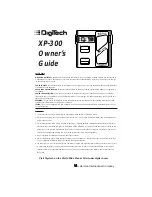
details. matrix must be diagonalizable. The
result always contains floating-point numbers.
eigVc(matrix)
Return matrix of eigenvectors of square matrix,
whose elements may be real or complex. The
eigenvectors are not unique, but are normalized
such that if the eigenvector is
V
=
x1, x2,
¢
, xn
then
x
1
2
+
x
2
2
+
¢
xn
2
=
1
eigVl(matrix)
Return the eigenvalues of square
diagnonalizable matrix, whose elements may be
real or complex.
Else See If
ElseIf See If
EndCustm See Custom
EndDlog See Dialog
EndFor See For
EndFunc See Func
Endif See If
EndLoop See Loop
EndPrgm See Prgm
EndTBar See ToolBar
EndTry See Try
EndWhile See While
entry([integer])
Return previous entry-line expression from the
history area. If used, integer cannot be an
expression and must be in the range 1 to 99.
See also ans().
exact()
(expr [,tol]), (list [,tol]), (matrix [,tol])
Evaluate argument with Exact mode arithmetic
regardless of the current Mode setting. tol, if
used, specifies the conversion tolerance and is
zero by default.
Exec string [,expr1] [,expr2] ...
Execute string interpreted as Motorola 68000
assembly language op-codes. expr1and expr2
are optional input arguments. Misinformed use
of Exec can lock up the calculator and cause
data loss.
Exit
Exit the current For, While or Loop block.
exp
▶
▶
▶
▶
list(expr,var)
Convert expr to a list of the right-hand sides of
equations separated by 'or' in expr. Used to
extract individual solutions from results of
solve(), cSolve(), fMin() and fMax().
expand()
(expr), (list), (matrix)
Expand argument with respect to all variables
with transformation into a sum and/or difference
of simple terms. See also Factor()
(expr,var), (list,var), (matrix,var)
Expand argument with respect to var by
collecting similar powers of var and sorting the
factors with var as the main variable. expand()
also distributes logarithms and fractional powers
regardless of var. Specifying var can save time,
memory and result in a smaller expression. If
the argument only contains one variable,
specifying it as var may result in more complete
partial factorization. propFrac() is faster but less
extreme than expand(). See also comDenom()
and tExpand().
expr(string)
Return the evaluated expression in string.
ExpReg
xlist,ylist[,[freqList],[catlLst],[catincList]]
Calculate exponential polynomial regression
and update all statistics variables. First four
arguments must be variable names or c1-c99.
Last argument need not be a variable name and
cannot be c1-c99. All lists except catincList
must have equal dimension. The regression
equation is y = a*b^x.
factor()
(expr), (list), (matrix)
Factor argument with respect to all variables
over a common denominator. Argument is
factored as much as possible toward linear
rational factors without introducing new non-real
sub-expressions.
(expr,var), (list,var), (matrix,var)
Factor argument with respect to var, as much as
possible toward real factors linear in var, even if
irrational constants or subexpressions are
15 - 7
Summary of Contents for TI-92+
Page 52: ...Component side of PCB GraphLink I O connector detail 1 41...
Page 53: ...LCD connector detail PCB switch side 1 42...
Page 54: ...Key pad sheet contact side Key pad sheet key side 1 43...
Page 55: ...Key cap detail 1 44...
Page 57: ...Component side of PCB with shield removed A detail view of the intergrated circuits 1 46...
Page 410: ...void extensionroutine2 void Credit to Bhuvanesh Bhatt 10 4...












































